
“I wondered if I had the courage to go through with this plan. It would cost me my marriage if Lyle was innocent. If he were guilty – it could cost me my life…”
Director: Andrew L. Stone
Starring: Doris Day, Louis Jourdan, Barry Sullivan, Frank Lovejoy, Jack Kelly, Ann Robinson, Barney Phillips, Jack Kruschen, Aline Towne, Hank Patterson, Ed Hinton, Mae Marsh
Screenplay: Andrew L. Stone
Synopsis: After a violent quarrel with her jealous husband, Julie Benton (Doris Day) rushes out of the country club and climbs into her car. She is in the act of driving off when Lyle (Louis Jourdan) throws himself into the car. The quarrel goes on during the drive, its cause Julie’s conversation with Cliff Henderson (Barry Sullivan), a cousin of Julie’s first husband. Julie accuses Lyle of humiliating her by his actions, and of harbouring an unreasonable jealousy that objects to her even talking to any other man. She warns him that she cannot and will not tolerate his behaviour – even if that means leaving him. At this, Lyle turns suddenly and presses his foot over Julie’s, causing the car to accelerate to dangerous speeds on the winding road. As she fights to control the vehicle, Julie begs Lyle to release her but he will not. At the very last, even as the car swerves across a cliff-side road, Lyle removes his foot and seizes the wheel, bringing the car to a screeching halt. Julie jumps from the car and runs, finally collapsing in a sobbing heap. Lyle runs after her, begging her forgiveness and asking her to help him fight his uncontrollable jealousy; telling her that at first he meant only to frighten her, but then couldn’t stop what he was doing; that he loves her so much, the thought of losing her is unbearable… Later, at home, Julie tells Lyle the subject of her conversation with Cliff – that Cliff is convinced that Julie’s late husband, Bob, did not commit suicide as was ruled at the time; or that at any rate, if it was not suicide it was not due to financial pressures as he, Cliff, had offered his assistance and been refused. Lyle is at first sympathetic, but as Julie continues to muse over the painful subject of what could have triggered Bob’s suicide he grows angry, finally insisting that she leave the past in the past. A stunned Julie realises that here, too, is a manifestation of Lyle’s jealousy. He admits it, adding that he envied Bob even while he and Julie were married. The next day, Julie seeks out Cliff at the club, and asks to talk privately. She questions him, and Cliff reiterates his claims about Bob, adding that the financial deal in question would have been good for both of them. Noticing Julie’s nervousness, he then asks if she’s expecting Lyle? Julie defends her husband, but admits that his jealousy is difficult to cope with. Cliff asks what happened between the two of them the days before after their quarrel. At first Julie evades the issue, but finally finds some relief in unburdening herself. An increasingly worried Cliff finally asks her if it ever occurred to her that Bob did not commit suicide at all? A horrified Julie recoils from the idea, but Cliff presses her remorselessly, finally bringing her to admit that Lyle was staying with them at the time of Bob’s death, and was in the house that night – but, she insists, that doesn’t prove a thing… Later, at the club, Cliff catches up with Julie again and tries to make her see that she is in danger; that the day before he almost killed her on no provocation at all. Finally, to herself, Julie admits that she has to know the truth – whatever the cost. That night, as they lie in the darkness, Julie speaks tenderly to Lyle, then whispers that she has been thinking about what he said to her, about Bob, and wondering what he would have done if Bob hadn’t died…? She tells him that her love is every bit as violent as his, and implies that she perhaps wouldn’t have minded if… A wary Lyle insists that Bob’s death was suicide, then comments that as soon ago as yesterday Julie had no such thought – because if she had, she would never have done anything so dangerous as threaten to leave him. He then admits that he did kill Bob – and warns Julie that she must never, ever try to get away from him…
Comments: This review of Julie is likely, I think, to turn out rather like the film itself: you’re going to have to sit through quite a lot of nonsense before you get to The Good Bit.
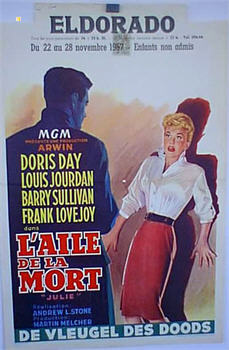

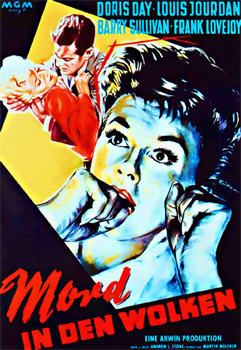
One of the more interesting film-making partnerships was that of husband-and-wife duo Andrew and Virginia Stone, which lasted from the 1940s into the 1970s. The Stones generally worked independently, in most cases sharing the tasks of editing, writing, directing and producing between themselves and having their films distributed only by the studios. Over time they built up a stock company of competent actors who returned again and again, usually taking the supporting roles while the Stones expended their modest budgets on a couple of name stars. They favoured location shooting, and often worked in real buildings or other structures in preference to using sets. Though they never really cracked the big time, the Stones were responsible for some interesting productions; their trademark tends to be handling seemingly predictable genre fare in an unexpected way.
The Stones’ 1956 thriller, Julie, was produced through the small, independent company, Arwin Productions, by Marty Melcher – Doris Day’s third husband and her manager (and, as would be revealed after his death, the misappropriator of most of her income). As it turned out, the production was a difficult experience for almost everyone concerned. By this time the Day-Melcher marriage had shrivelled into a purely professional partnership. Melcher himself was generally disliked, and his presence throughout caused a variety of problems. Doris Day and Louis Jourdan were friends as well as neighbours, and enjoyed working together, but neither one of them got along with Andrew Stone. Finally, and most significantly, the plot of the film ended up evoking for Doris some extremely painful memories of her abusive first marriage; and while she did go on to make Midnight Lace in 1960, Julie may have been the cause of her backing away from what obviously was, in the mid-1950s, a concerted effort to change her image.
It is well-known that a number of films produced independently and semi-independently during the fifties and sixties subsequently slipped through the legal cracks after the breakdown of the studio system, remaining conspicuous by their absence throughout the VHS and DVD revolutions while the rights issues were slowly sorted out. When I belatedly became aware of Julie – which had, of course, never played television here for the same reason – and went looking for a copy, it was to learn that it was notorious as “the” missing Doris Day film, and to discover legions of frustrated Doris fans tearing their hair and clamouring for its release. For quite some time their cries went unheeded for some time, but eventually Julie was given a release of a kind through the Warner Bros. Archive Collection…at what I do not hesitate to call an extortionate price. (And no overseas shipping.) Evidently The Men In Suits had heard that clamour, and it sounded like ching-ching.
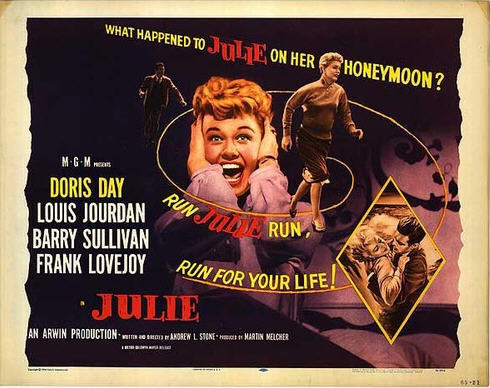
Now, I wanted a copy of Julie; I wanted a copy badly (for reasons that I promise will eventually become clear); but the ridiculous price asked for what is really just a tarted-up DVD-R was enough to make me baulk and fume for over eighteen months, until I found a secondary organisation a little less intent upon making a 2500% profit on the sale. My heartfelt thanks go out to those good people, and so (perhaps more to the point) does much of my future business.
So after all that, was it worth it?
Yes and no. First no, and then yes. Or rather, YES!!!!
The first half of Julie is pretty hard going, and in fact offers the viewer any number of excuses to give up on it – right from its opening moments. It is hard to believe, but this film scored two nominations at the 1957 Academy Awards, both of them for what I personally consider its weakest points, its theme song and its screenplay. Julie has what I’m inclined to call a completely typical 1950s theme, all sweeping strings and ooh-oohs and angel choruses – and with lyrics that you realise after the event are hilariously inappropriate for this film – but anyway, it went on to lose out to Doris’s other nominated song, “Whatever Will Be, Will Be (Que Sera, Sera)”.
As for the screenplay—well, let’s just say it speaks volumes for the original screenplays of 1956 (and honestly, you’ve never seen such an odd collection of nominees…and I’ll bet you can’t name the winner!) that Andrew Stone’s work on Julie got anywhere near the Academy Awards. Even for a film of this genre, the script is overwrought and often silly. It also makes the fatal mistake of giving Julie / Doris a completely unnecessary voiceover, which apart from telling things we already know perfectly well, serves only to ramp up the already excessive melodrama to quite untenable levels.


However, the overriding problem here is the character of Lyle Benton, who from our very first glimpse of him is so obviously such an utter raving psychotic that you can’t for a moment imagine him being able to hide his insanity long enough first to ingratiate himself with Julie and the unfortunate Bob, or later to court and marry Julie. The fact that it is not until he nearly kills both her and himself on next-to-no provocation that Julie notices anything wrong does not exactly gives us a high opinion of either her judgement or her perspicacity.
Then there’s the distracting side-issue of how someone with a thick French accent ended up with a handle like “Lyle Benton”.
(Also potentially mockable, at least by people of a certain turn of mind, is the film’s tagline: “What happened to Julie on her honeymoon?” Well, uh…)
Now…I realise I must sound like I’m doing my best to warn you off this film, but honestly that’s not the case: I’m merely letting you know that there are shoals to be got through before you reap the final rewards. Of course, whether those rewards are sufficient to make up for the bumps and bruises acquired along the way is up to the individual. They are for me. That’s all I’ll say at this point.
Julie starts in medias res, the credits and the title song still playing as our fuming heroine storms out of the country club and into her car, where her husband catches up with her. Even these first moments bode ill for the viewer, with superimposed footage and Julie / Doris jerking the steering-wheel from side to side for no reason while “driving” even more recklessly than usual. However, in the long shots we’re offered some pretty good stunt-driving, and our first glimpses of the location photography that is one of the film’s strengths. (This early section was shot around Carmel.)


Although it goes over the top to a risible degree, there are some genuinely uncomfortable moments in these opening scenes of Julie, including the suggestion that Julie is the type of woman who forgives too easily, if only the man says “I love you” often enough afterwards; her subsequent defence of Lyle to Cliff – “He didn’t know what he was doing”, and “He’s a very sweet and wonderful guy, ordinarily” – is only too depressingly familiar.
Julie is driven to seek out Cliff again and question him about Bob’s circumstances prior to his death, which leads to the conclusion that “financial pressures” could not explain his suicide, unsatisfactory as that was as an explanation all along. Of course, the viewer might be inclined to wonder why Cliff didn’t raise these issues at the inquest (a line of dialogue about him being out of the country at the time or some such would have been helpful here); except that Julie’s later “shocking” revelation that Lyle was in the house the night Bob, ahem, killed himself suggests that there was no inquest, since presumably that would have come out at the time, nor indeed any investigation of any kind – not even a post-mortem, if Cliff’s suggestion, that Bob was murdered by strangulation and then hung up in the basement, is supposed to be accepted as the truth. The hell, Californian law enforcement of 1956!?
The upshot of all this is that the possibility of Lyle’s guilt lodges itself like a burr in Julie’s consciousness, until she decides that she has to try and get at the truth, whatever the consequences. She finally decides to try and lure Lyle into confessing through a combined implication that (i) she loves him so much she doesn’t care what he’s done, and (ii) being loved so much he’d commit murder to have her is actually kind of flattering. The resulting scene is a remarkable moment in motion picture history, as it takes place while Julie and Lyle are in bed together. This may even be the first film to challenge that particular (and rather ridiculous) cinematic taboo. I wonder, did they get away with it because Julie was an independent production, or because it was – gasp! – Doris Day!?


Mind you, the implications here are rather dismaying. Apparently it’s okay for a married couple to occupy the same bed as long as they’re discussing the murder of her first husband, and she’s having her life threatened. Just don’t you try and slip any of that icky “love” stuff in, no, no, no!
Anyway, Julie gets the confession she wanted and feared – and then, of course, she’s trapped.
Over its next phase, Julie becomes part of an interesting subset of 1950s dramas, what we might call “marriage as nightmare” films, which offer a rather striking contrast to the prevailing image of that decade. In fact, Julie would make an excellent double bill with Cause For Alarm!, in which (ironically enough) Barry Sullivan plays a violently paranoid husband determined to make his wife Loretta Young’s life miserable…at the very least.
Awkwardly enough for Julie, Lyle works from home—which is to say, he’s a pianist beginning his preparations for a concert tour, who at the present spends all his time at home practising.
(The film’s other main theme, a piece called “Midnight On The Cliffs” composed by Leonard Pennario, is used here, accompanied by dramatic shots of waves crashing violently onto the shore.)
The Bentons live in an isolated cliff-top house, and they only own one car…which means that Julie can’t get away from her husband for any reason without him knowing about it. She tries a series of feints, plotting to get Lyle to leave the house on foot while she takes the car and goes in the other direction. A kitchen crisis (faked by Julie dumping eggs and cream down the sink) seems promising—but of course, Lyle knows exactly what Julie’s up to; and before he strolls off smiling, he takes a moment to disable the car.
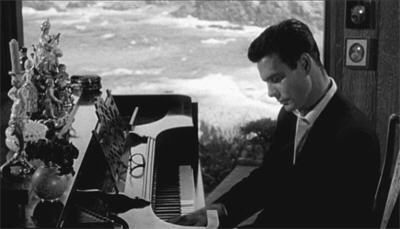
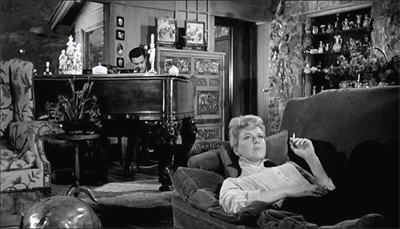
In a short sequence that simply screams “1950s”, and not in a good way, Julie doesn’t bolt at the first opportunity, but takes the time to pack a bag and collect all her toiletries first. Her eventual discovery that the car won’t start makes her almost frantic, but by now she’s so wound up that she doesn’t let it stop her. She runs down the road and manages to flag down a lift into town before Lyle returns and realises that his manoeuvre hasn’t worked. He then fixes the car and heads off after his fleeing wife – and from this point, Julie becomes the story of an increasingly deadly game of cat-and-mouse.
The game begins on the streets of Monterey, as Julie hides from her cruising, searching husband while first trying unsuccessfully to get Cliff on the phone, and then finally making a desperate appeal to the police. I’m not altogether sure what Julie really says about Monterey: either that it’s the most laid-back place in the world, or a place where people just don’t care. When Julie, in evident terror, begs a shop-keeper for directions to the police station and “a way out the back”, the woman directs her without batting an eyelid; and likewise, when she rushes into the police station and demands to see someone in authority, she is waved through without question, and almost without a glance.
Still, the cops listen and take Julie seriously enough to at least call Palo Alto, learning that the police there that Bob’s death was “thoroughly investigated” and that they are “completely satisfied” it was suicide.
Yeah. Right.
When Cliff receives Julie’s phone message and comes hurrying along, he receives the same casual courtesy as Julie herself – they don’t even ask who he is, when he barges into a presumably private interview – and arrives just in time to hear that “they only have Julie’s word for it”, and the spousal testimonial privilege mis-invoked for one of the seventeen squillion times in the history of popular entertainment.
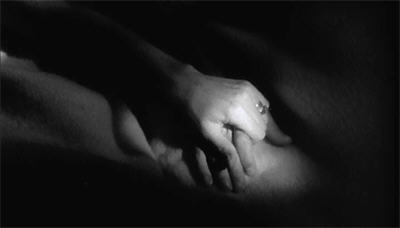
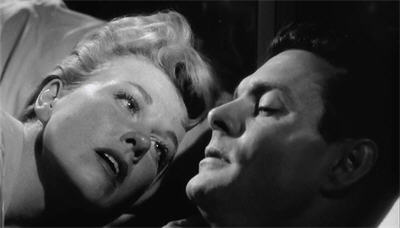
And then Lyle wanders in – and it becomes he said / she said, with Lyle, playing the heartbroken but noble husband, making certain allegations about the nature of the relationship between Julie and Cliff…
It is from here that Julie, to this point simply too over-the-top to be taken seriously, begins to assume a nasty air of credibility. The new tone is set by one of the Monterey police officers:
Cop: “If we hauled in every guy who threatened his wife, we’d need a jail the size of the Pentagon.”
Cliff then tries to organise some protection for Julie, but the cops shrug it off, arguing that there’s nothing they can do, and that they don’t have the manpower even if there was; although given that Julie’s arrival found the majority of the Monterey P.D. deeply engrossed in poker, this last assertion provokes an eyebrow-lift.
On their way out, Cliff and Julie encounter Lyle, all big sad eyes and hurt feelings. Very quietly, he tells Julie that she has made a mistake…
From that moment Cliff as well as Julie is gripped by a sense of panic. They decide that Julie has to get out of town, go—anywhere; away; San Francisco in the first instance, where Cliff currently lives and works. There are no flights for hours, so that means renting a car. While things are being organised, there is a phone-call for Julie – but when she reluctantly takes the receiver, there is only an ominous click…
A serio-comic scene follows as Cliff and Julie try desperately to get the guys at the garage to hurry up…only to discover that, like all good Montereyans, they just naturally take a leisurely approach to things.


Once in San Francisco, Julie checks into a reassuringly busy hotel under an assumed name. She and Cliff have taken all possible precautions to avoid pursuit, and he further warns her not to contact anyone she knows; yet while she is freshening up, the phone in her room rings. At first there is only music – “Midnight On The Cliffs”, natch – but then Lyle tells Julie quietly that she is going to die, and there’s nothing she can do but wait for it to happen…
(Lyle is calling from Monterey! How exactly he manages this little trick, we never do find out for sure. Cliff suggests that he guessed San Francisco and got a private investigator on their tails in time, but I suspect the truth is that this isn’t the first time Cliff has checked into this particular hotel with a woman while using a fake name.)
This incident drives Cliff and Julie back to the police, with their San Francisco representatives (played by Frank Lovejoy and Jack Kruschen) being no more actual help, but a lot more receptive – probably because, as they make quite clear, they’ve seen altogether too many of these sorts of cases. They listen, they believe, and they sympathise; but based on their experience, they are anything but reassuring:
Cop #1: “We understand the gravity of your situation. It’s surprising how many men flip like that over a woman.”
Cop #2: “Usually it’s an estranged wife who wants no part of the guy.”
Cop #1: “Yes, that’s part of the pattern. Most of these lovesick guys would rather kill their wives than let them go.”
Cop #2: “You know, in the Bay area we average two of these cases a week?”
Well, well. Who knew that San Francisco was such a stronghold of heterosexual misery? Although I guess that would explain a few things…

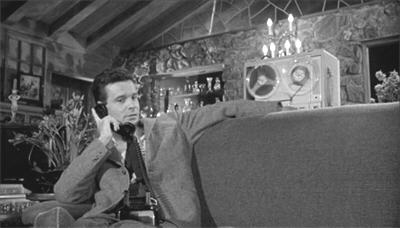
Cop #1 – otherwise Detective-Lieutenant Pringle – tells Julie grimly that there is no “island of safety” for a woman in her situation, and gives her the only advice he can: to change her identity, to get as far away as possible, and to hope for the best. Cop #2 – Detective Mace – adds that she shouldn’t be one of those women who, “Think it can’t happen to them. They stick around. They rationalise. And…”
With no choice, Julie does what she can to make plans: to return to New York, and to try to get her old job back – which, this being a time of transition, is referred to as being an “airline hostess”. Pringle then makes a deal with her: if she promises to get on the first flight in the morning, he’ll assign two men to protect her until then. He sends her home to pack her things and get a few hours’ rest.
It turns out that the gorgeous cliff-top mansion near Carmel is just “their summer home”; the Bentons’ main residence is in Palo Alto – not, we hope, the same house in which Julie lived with Bob. As Julie sleeps fitfully, and Cliff sits by her, and the two cops chain-smoke—all of a sudden, from out of nowhere, there is a blast of music; piano music. Julie jerks awake, screaming hysterically. One of the cops traces the noise to a tape-recorder left in a car parked outside…
And so Julie departs to pick up the threads of her old life, while Cliff embarks upon a new mining project. After a lapse of some time, having seen and heard nothing from Lyle, Julie ventures to let Cliff know that she’ll be coming in on a San Francisco flight, and spending the night in town with a friend and fellow hostess, Denise Martin, at her apartment. This message is conveyed to Cliff on location by his secretary, who also tells him that a client, Mr Royston, is getting impatient about an urgent matter of business. Ordered to set up a meeting for the following morning, the secretary tries, only to find that Mr Royston – or rather, “Mr Royston” – is very set on seeing Cliff that night. He presses her about where he will be but she holds her ground, only confirming, in answer to a suggestion that an on-site meeting might be possible, that Mr Henderson won’t be leaving work before 6.00pm.


Meanwhile, at Denise’s apartment, Denise makes plans to go out, while Julie makes plans to stay in. Denise has noticed how jittery Julie has been ever since they arrive in San Francisco, but Julie evades her questions.
When Cliff pulls away from the office at which he oversees the mining operation, he has someone on his tail. At length he realises that he is being followed, and who it is; who it must be. He stops his car abruptly and climbs out, confronting Lyle angrily – only to find himself staring down the barrel of a gun.
In spite of Cliff’s denials, Lyle insists that he knows Julie is in town, and that Cliff is going to take him to her. They climb into Cliff’s car, Lyle holding the gun steady as they drive. Nevertheless, without warning Cliff throws himself from the car and down a shadowy bank – only to take a bullet in the body when he tries to run. Lyle hurries down to Cliff’s inert form and searches his pockets – and finds Denise’s address.
Lyle is about to drive off when he sees Cliff move. He hesitates, but a man from a farmhouse nearby has come outside to investigate the odd noises, and so he does leave – only to have second thoughts some way down the road and turn around. By the time he gets back, the gravely wounded Cliff is dragging himself towards the farmhouse. A chase of sorts ensues, but at the last moment Cliff manages to fall against the front door and attract the farmer’s attention. The man helps him in and, wonder of wonders, has a phone that works. He calls the sheriff. An indecisive Lyle overhears him insisting that the injured man “won’t last long” and finally gives it up and returns to his pursuit of Julie.
Cliff, though fading fast, tries to get a warning to Julie but can’t remember the details of her address. The farmer, Ellis, gets hold of the San Francisco operator, and patiently helps as Cliff begins working through the names of all the possible apartment buildings. They finally hit upon the right one, but the manager there has clocked off for the night. Just before he loses consciousness, Cliff gasps faintly for Ellis to get in touch with Lt Pringle of the San Francisco police…


Julie, having bid goodnight to Denise and her date, receives a most unwelcome call from the airline, telling her that one of the other hostesses has called in sick and that, unless she can locate Denise in a hurry, she’s it. Julie tries to beg off, but is given little encouragement. Sure enough, she gets the call-up and reluctantly gets ready to return to work. She writes two notes, one for Denise which she leaves on the dresser, and one for Cliff, which she pins to the front door.
Outside, Pringle has arrived. He and Mace head into the apartment building, issuing their two men strict instructions to watch the entrances and challenge anyone who wants to get in. Then, armed with only the imperfect information from Cliff’s muttered message, they start knocking on doors – all sixty-four of them. Rather stupidly, they inquire for “Julie Benton”, who is only a casual visitor, rather than “the airline hostess(es)”.
When Lyle arrives, it is to see a police car sitting on the street outside the building. He pulls up over the road, gets out, and waits in the shadows. He is rewarded for his restraint and patience when the combined effects of a single dodgy elevator, a more convenient staircase and an unimaginative police guard – Pringle said challenge people going in, not out, right? – allows Julie to walk unknowingly past her potential rescuers and hurry off into the night. Lyle begins to follow her. Hearing footsteps, Julie gets panicky, although she sees nothing but shadows; but a final burst of speed – not easy in a pencil-skirt and heels – puts her safely into a cab and on her way to the airport. Thwarted by some passers-by in taking a shot as Julie crosses the road, Lyle settles for “follow that cab”.
Eventually – eventually – Pringle and Mace find Julie’s note to Cliff and, inside, evidence that Julie works for Amalgamated Airlines (catchy!). Pringle calls Amalgamated, hoping to find out what airport she’s leaving from and on what flight, and in a moment of startlingly naked realism is put on hold before he can speak – “Just a minute!” “I’ve had that happen to me. Nothing’s more exasperating,” comments the pragmatic Mace, as Pringle fumes.

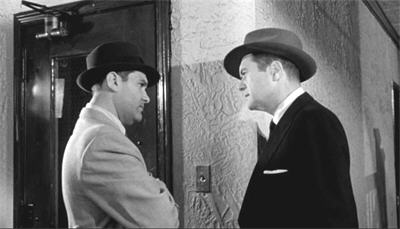
All of which gives Lyle time to identify Julie’s flight. He is momentarily baulked on the tarmac by the fact that it is Julie herself doing the meet-and-greet, but she is called inside and he manages to slip on board and into a seat while her back is turned, turning up his coat-collar and hiding his face in a newspaper. The doors are shut, and the plane starts to taxi, as Julie walks the aisles doing the seatbelt and overhead compartment thing.
(As with the rest of the scenes in Julie, which were shot in real hotels, clubs, offices and apartment buildings, as well as on location, this sequence was shot in a real plane and required the development of a dolly small enough to move up and down the aisle.)
Finally Pringle gets his call through and learns that Amalgamated’s only flight out is due to depart at 11.45pm – and it’s now 11.50pm. Pringle tries to find out for certain if Julie is on board and is put on hold again. (“Just a minute!” chirps the operations’ manager, which appears to be Amalgamated’s slogan.) The cops get confirmation that Julie is on board and their first thought is that she is now safe from Lyle.
Their second thoughts, as second thoughts tend to be, are far less comforting. Pringle and Mace eye each other, and start coming up with reasons why Lyle couldn’t possibly be on that flight – each one less convincing than the last. Mace wants at least to send a warning, but Pringle doesn’t think it should be done through an intermediary: there are too many lives at stake if something goes wrong. He leaves Mace behind to watch for Lyle while he heads for the airport.
When the call to the plane gets through, Julie’s fellow-hostess, Valerie, is asked to relay to her a message that she is wanted in the cockpit. There, the co-pilot hands her a head-set, while the pilot mentions Lt Pringle, which is enough to give Julie a cold moment.


“I don’t quite know how to break this to you…” Pringle begins.
In fact, he goes for the “Grandma was playing on the roof” approach, first telling Julie only that Lyle shot “a man”, and assuring her that “the man” is going to pull through, before letting her know that it was Cliff. He then hints that Lyle might be on board – not that he really thinks so – it’s just a long-shot – but…
If Lyle is there, Pringle adds, the plane can’t be allowed to leave the state. The pilot, listening on another head-set, comments that they’re almost to the border. Pringle instructs him to gently turn the plane around, and to try to keep it over uninhabited areas where the lights below won’t give them away.
And if Lyle is on board – what then? No airport security, of course, so he certainly has his gun with him. The pilots have a hand-gun, too, and Pringle has to nix half-a-dozen potential courses of action that boil down to the prospect of shots flying in the cabin of a plane.
After some useless backing-and-forthing, Julie insists they have to know for certain, and the only way to do that is for her to do a walk-through to look for Lyle, scrupulously avoiding anything like eye-contact so that if he is there, he won’t know she knows. The others reluctantly agree. Pringle advises her to move quickly to the back of the plane without looking around, then do the walk-through from behind.
Julie sets out, head up, eyes front – although her “quick walk” is interrupted by a series of passengers wanting service. She gets to the back, pours the demanded coffee, and fends off questions from Valerie regarding her obvious shakiness. On the trip back, she gets no further than a third of the way along the aisle before a familiar back of a head looms into view. She spins, and bolts to the back of the plane, phoning confirmation to the cockpit.

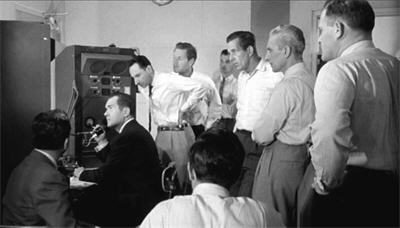
The pilot radios the news through to Pringle at the airport, who demands that all appropriate personnel including the top brass be summoned and all possible emergency preparations made. Pringle and the pilot debate whether it is preferable to keep Julie in the cockpit, an obvious change of procedure that might well alert Lyle to the fact that something is up, or leave her in the cabin and risk him spotting her. It’s the pilot’s call – but his only definitive action is to put the plane on auto-pilot.
In fact, the pilot’s first impulse is to arm himself and to go out into the cabin; but his second thoughts lead him to buzz Julie up to the cockpit instead. He tells her the door will be unlocked for her, and that she should get inside as quickly as possible.
Julie collects some coffee on a tray as a cover, turns to walk up the aisle—and suddenly finds herself locking eyes with Lyle.
She bolts ahead, Lyle on her heels. She gets through the cockpit door, but not quickly enough to shut and lock it. Inside, Lyle grabs her, pointing his gun at the pilot, who points his own back.
After a single frozen second, Lyle fires. Julie tears herself free of him and dashes to the front of the cockpit. The pilot returns fire before collapsing and dying, and Lyle reels back. The co-pilot lunges for the pilot’s dropped weapon, but Lyle still has him covered. “Why don’t you try to pick it up?” he hisses as he sinks to the floor.
Out in the cabin, the unflappable Valerie (who of course doesn’t know what’s actually going on) is busy assuring everyone that those were just engine-noises. Hey, you know how planes backfire – right?

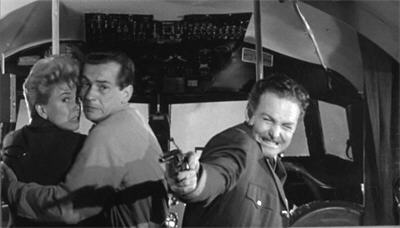
Meanwhile, Lyle, fading but determined to the very last, responds to Julie’s hysterical demand that, if he’s going to shoot her, to just get it over with, with a half-smile, a weary shake of the head, and the news that he has a much better idea:
“I promised you it wouldn’t be easy. You’re going to be in this airplane – high in the air – with nobody to fly it.”
There is only time for a look of horror to cross the co-pilot’s face as the significance of these words strikes him, before Lyle, with perfect deliberation, shoots him dead – and then dies himself.
“Well, now, I know that was a shot!” insists one of the female passengers out in the cabin, as Valerie gamely persists in trying to convince everyone otherwise. The old biddy decides to see for herself, and storms up the aisle before Valerie can stop her…and we get the traditional throwing open of the cockpit door, and the revelation of things that the passengers probably did NOT want to know.
We also get the even more traditional “cure hysteria by giving someone a thorough shaking” scene, as the old biddy loses it and then gets her false teeth rattled in her head by a doctor, who pauses for a moment in the act of pushing his way towards the cockpit to deliver this ancient remedy.
Yes, of course there’s a doctor on board.
Julie, in spite of everything, instinctively responds by trying to calm everyone down and get them back to their seats. She announces only that “the captain has been injured”, and takes the doctor up front.
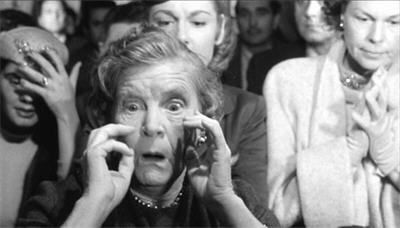

The pilot is dead, but the co-pilot – Jack – is still with us. Concealing his wound, he too adds his two cents to the attempt to make everyone sit down and shut up, before firmly closing the cockpit door and allowing the doctor to examine him. Julie and Valerie succeed in settling everyone down before the former returns to the cockpit, where she learns the very unwelcome news that Jack is losing blood fast and is very likely to pass out before they can land. The doctor starts rounding up everything he has that might retard the bleeding, and help to keep him conscious. Jack asks Julie to see if there’s another pilot on board, but she already has – using the “someone to work the radio” method – and there isn’t.
As the doctor shoots him up with something-or-other, Jack makes the decision to return to San Francisco – further away – rather than to try and put down at Sacramento, because he wants the landing to have both full daylight and precision radar.
But it is not until he orders her to sit down in the pilot’s seat that Julie realises what is really in Jack’s mind…
And sit down she does. And so history is made.
Or as a dear friend of mine once rightly put it:
OMIGODDORISDAYISFLYINGTHEPLANE?!
Yes, indeed she is.
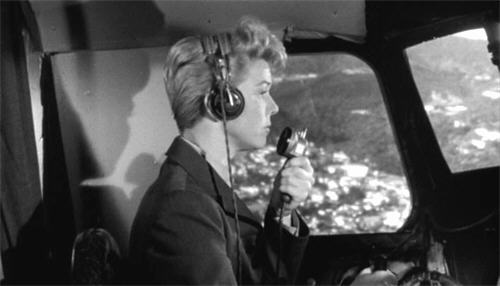
So— Just over a year before the release of Zero Hour! gave us “traumatised pilot fights his demons to land a stricken plane”, Julie offered the world “untrained civilian has to be talked right down to the ground”. Memorable as Dana Andrews and his war memories and uncontrolled perspiration ended up being – and they were quite inspirational in the long run, of course – Doris Day got there first.
What a time to be a cinema-goer. Or a nervous flyer.
(The mind boggles at the thought of what the Zuckers might have done if Julie hadn’t been effectively a lost film. The first half of it almost sits up and begs to be mocked, while as for this…)
Anyway—
Julie loudly protests her incapacity, announcing that the full extent of her flying experience was one quiet flight during which the pilot let her take the controls for a few minutes under perfectly calm conditions. Jack takes no notice, talking down her reasons why she can’t and instructing her in what to do – and finally she gives in and obeys. She already knows how to work the radio, which at least puts her one up on some of her partners in crisis, but that’s about it. Nevertheless, Jack switches off the automatic pilot, and it’s Julie’s plane…
Julie and Jack spend some minutes on lessons in rudimentary control – turning, flattening out, keeping the nose where it should be. Jack warns her that the positioning of the nose and wings is the one thing that no-one can help her with. He has the doctor keep his eye on the artificial horizon and, later, the air speed.
Midway through these lessons Jack passes out, but is brought back with some amyl nitrate. The doctor tells Julie he might not be able to bring him around a second time.


News of all this is passed to San Francisco, where Lt Pringle is one of many nervous people up in the tower. They’ve cleared the longest runway, and all the necessary emergency equipment is being put into position. The head flight controller insists that everything should be all right, as long as Julie keeps her nerve and does what she’s told. On prompting from Jack, the controller then takes over and starts talking Julie in.
(Ah, dear. One thing all the men involved in the dangerous descent have in common – Jack, the main flight controller, and the guy in charge of the mobile unit who oversees the landing – is an infuriating tendency to call Julie “honey” in a condescending tone of voice. She’s landing a plane, people! – can we please not talk to her as if she were a slightly backward child, hmm? Frankly I wouldn’t have blamed Julie too much if, under the accumulated effect of all this inappropriate patronising, she jerked those controls at the last minute and wiped out the lot of them.)
Jack is in and out through all of this, and after putting down the landing gear and the flaps, passes out once and for all, leaving Julie to the flight controllers. As they begin their descent, the doctor volunteers to handle the throttles. Julie gets final instructions about braking from the tower, and then control passes to the mobile unit as the plane approaches the runway…
Well. Julie does bounce the plane rather horribly on the first attempt, but she puts the it down successfully on the second – in spite of an unnerving tendency to screw her eyes shut at the critical moment. There’s some swerving around, and a little brake squealing, granted; but if the landing of Amalgamated Flight #36 isn’t exactly the best on record, no-one’s ever going to be able to describe it as “probably the worst landing in the history of this airport”, either.
So there.

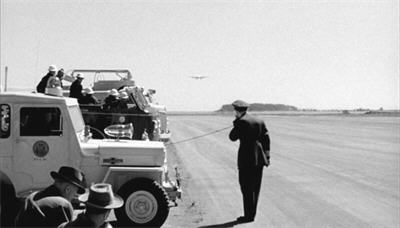
So now at last you understand why I love Julie in spite of all its flaws. It’s a strange film, taken all-in-all; a film that effectively changes identity at its midway point, turning abruptly from an extravagant melodrama that can hardly be taken seriously into an unpleasantly realistic story of a woman whose life is nearly destroyed by a stalker. Even the dialogue suddenly switches from fulsome and overwrought to terse and to-the-point, while that annoying voiceover disappears, too. It’s as if the Stones realised halfway through what they were doing wrong, but didn’t have the time or budget for re-shoots.
The opening up of the action also helps, as it allows for quality supporting performances from Frank Lovejoy, Jack Kruschen, Barney Phillips, Jack Kelly and Ann Robinson. (The hysterical old biddy, by the way, is played by silent film star, Mae Marsh.) More obvious virtues are the black-and-white cinematography, and the remarkable location work, which gives the film a grittiness it sorely needs.
And then, of course, there’s that epoch-making final sequence.
So no wonder hordes of frustrated people were passionately demanding this film’s re-release!…and yes, okay, that probably had more to do with Doris Day’s participation than with people sharing my peculiar cinematic proclivities. For the record, though, I’m filing this one under “disaster movies” rather than “psychos”; because, let’s be honest, and Louis Jourdan’s in-your-face performance as the deranged Lyle Benton notwithstanding, what everyone remembers after watching Julie is that omigoddorisdayisflyingtheplane…
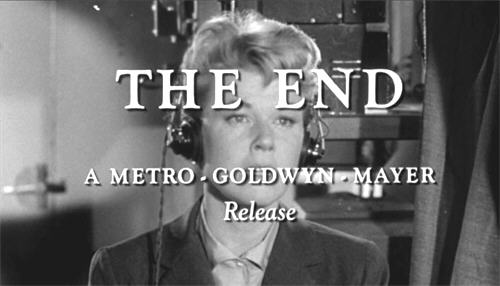

Lyle runs after her, begging her forgiveness and asking her to help him fight his uncontrollable jealousy; telling her that at first he meant only to frighten her, but then couldn’t stop what he was doing; that he loves her so much, the thought of losing her is unbearable…
People, if your Significant Other pulls this, it’s time to go. Things are not going to spiral up from here. The fact that it’s 2016 and so very many people still think utterly deranged behavior indicates Twu Wuv…
LikeLike
…but at least you’re IN A RELATIONSHIP!!
Sigh.
LikeLiked by 1 person
Well, OBVIOUSLY an abusive relationship is better than no relationship at all. What, do you want people to think you’re a creepy weirdo or something?
LikeLike
Too late… 🙂
(This is making me want to revisit Cult Of The Cobra, a rare instance of a man feeling inadequate because he’s not IN A RELATIONSHIP.)
LikeLike
Oh boy, our newest cinematic thread for Lyz to follow!
Sweetie, anyone that thinks of you that way obviously doesn’t know you at all, and/or is a drooling dipshit that can safely be ignored.
And don’t you say you think of yourself that way, dammit.
I will “Bah” you.
Don’t test me.
LikeLike
Well…I don’t think I’m creepy, but I can’t in conscience argue with “weirdo”. 🙂
LikeLike
Mmmm…all right, I’ll allow it. This time.
LikeLike
I like that this has Ann Robinson and Jack Kruschen from “War of the Worlds” and Barney Phillips from “Will the Real Martian Please Stand Up.” A true interplanetary cast!
LikeLike
I suspect that had more to do with Andrew Stone being an ex-MGM company boy than any intended allusion, but it’s a nice thought. 🙂
The Stones always had interesting ensemble casts; it’s another of the things I like about their films. It helps too that their central characters are usually older, even when they’re the “romantic leads”.
LikeLike
Pingback: Datos que no sabías sobre Doris Day